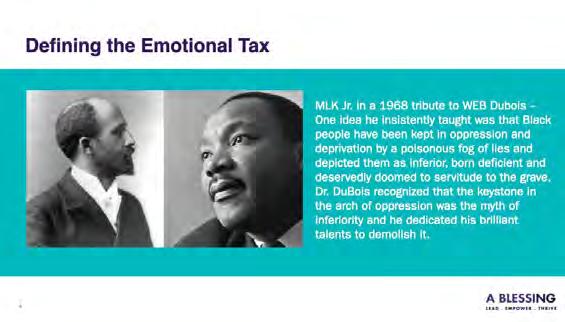
2 minute read
INTRODUCTION
has been widely acknowledged in a number of fields, among them, politics, sports, medicine and entertainment, but the impact of Black and women of color in business has been studied intermittently and imperfectly until the 2019 Women of Color in Business: Cross--Generational Survey©. Bonita C. Stewart and Jacqueline Adams conducted their 2019 Women of Color in Business: Cross-Generational Survey© to drive the conclusions in their well–received book, “A Blessing: Women of Color Teaming Up to Lead, Empower and Thrive.” Theirs is the first study to examine 4,005 female American “desk workers” by race (Black, LatinX, Asian and white) as well as by generation (Gen Z, Millennials, Gen X and Boomers).
Their proprietary research convinced the two Harvard Business School alumnae that there is a new and littleunderstood business imperative, which they are calling generational diversity. They challenge leaders, and the women themselves, to imagine the benefits of “wisdom” coupled with “vision.” Stewart and Adams found that younger Gen Z and Millennial women, especially Black and LatinX women, are more innovative than their white and older counterparts and are more likely to be first adopters of technology. Younger Black and LatinX women are more likely to seek the support of their managers and supervisors and are more likely to crave a sense of belonging at work than their elders. The research says that these younger women of color are ambitious, optimistic, mission-driven, entrepreneurial and feel in control of their futures. Older women, Boomers and Gen X, report that they have had to rely on themselves. Despite the renewed focus on diversity and inclusion strategies in the aftermath of the 2020 racial and social justice protests, the authors see the phenomenon of generational diversity as a key factor in the current corporate race for talent. By 2027, the U.S. Census predicts that the majority of America’s consumers and workers, Gen Z and young millennials (ages 18-29), will be people of color. Companies that understand and respond to the new imperative to both hire and retain these younger workers of color will be the winners. As African American leaders in technology and media with decades of lived experiences, Stewart and Adams have concluded that Black women are overqualified and overlooked. Although their research demonstrates that Black and women of color describe major differences from one another, by generation and specific race, the authors remain optimistic and confident about the tremendous potential for “teaming up” with allies of all stripes. They present a realistic playbook for progress and offer specific steps for inclusive leaders to drive revenue inclusion for all. Their research and their book focus on the workplace, but the authors also address the deeply rooted economic, sociological, and psychological roots of current campaigns for social and racial justice. They attempt to blow away the “poisonous fog of lies” described by W.E.B. Dubois a century ago, lies that oppressors have used to demean and depress women and people of color. The fog’s impact has been variously described both as an “emotional tax” and the “imposter syndrome.” The authors, however, strive to counter the old, poisonous narrative with data that confirm and affirm Black brilliance and progress for all.











